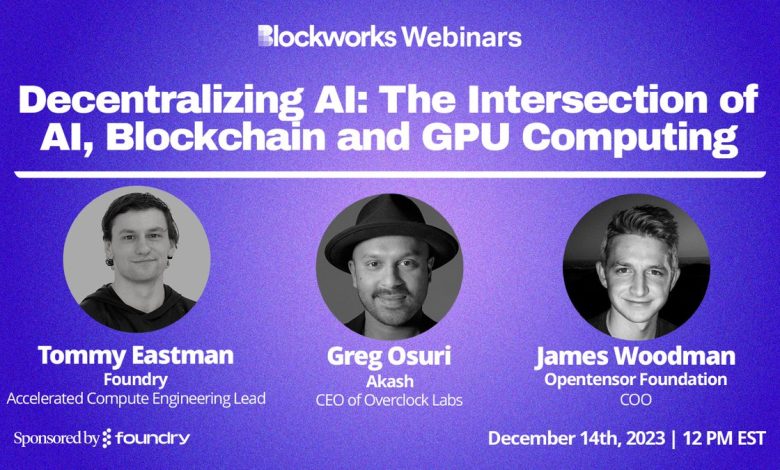The Intersection of AI and Blockchain: A Conversation with Experts

- Understanding the basics of AI and blockchain technology
- Exploring the potential synergies between AI and blockchain
- Insights from industry leaders on the future of AI and blockchain integration
- Challenges and opportunities in combining AI and blockchain
- Real-world applications of AI and blockchain convergence
- Key considerations for businesses looking to leverage AI and blockchain technologies
Understanding the basics of AI and blockchain technology
Understanding the fundamentals of artificial intelligence (AI) and blockchain technology is crucial in grasping the potential impact of their intersection. AI refers to the simulation of human intelligence processes by machines, including learning, reasoning, and self-correction. On the other hand, blockchain is a decentralized, distributed ledger technology that securely records transactions across a network of computers.
AI and blockchain technology are often seen as complementary due to their unique capabilities. AI can enhance the efficiency and accuracy of blockchain networks by automating processes and analyzing vast amounts of data. In contrast, blockchain can provide transparency and security to AI systems by ensuring the integrity of data and preventing tampering.
One of the key benefits of combining AI and blockchain is the potential to create trustless, autonomous systems that operate without the need for intermediaries. This can revolutionize various industries, such as finance, healthcare, and supply chain management, by streamlining operations and reducing costs.
Exploring the potential synergies between AI and blockchain
Exploring the potential synergies between artificial intelligence (AI) and blockchain technology can lead to groundbreaking innovations in various industries. The combination of AI’s ability to analyze vast amounts of data and blockchain’s secure and transparent ledger system has the potential to revolutionize processes such as supply chain management, healthcare record-keeping, and financial transactions.
By leveraging AI algorithms to analyze data stored on a blockchain, companies can gain valuable insights into consumer behavior, market trends, and operational efficiencies. This can lead to more informed decision-making and improved business outcomes. Additionally, the use of smart contracts on blockchain platforms can automate processes based on AI-generated insights, streamlining operations and reducing costs.
Furthermore, the integration of AI and blockchain can enhance cybersecurity measures by detecting and preventing fraudulent activities in real-time. AI-powered security systems can analyze patterns of behavior on a blockchain network to identify potential threats, while blockchain’s immutable ledger can ensure the integrity of data and transactions.
In conclusion, the intersection of AI and blockchain presents a wealth of opportunities for innovation and growth. By harnessing the power of these technologies in tandem, businesses can unlock new possibilities for efficiency, security, and competitiveness in the digital age.
Insights from industry leaders on the future of AI and blockchain integration
Industry leaders are optimistic about the future of integrating artificial intelligence (AI) and blockchain technologies. According to experts, the combination of AI and blockchain has the potential to revolutionize various industries, including finance, healthcare, and supply chain management.
One key insight from industry leaders is that AI can enhance the security and efficiency of blockchain networks. By using AI algorithms to analyze data and detect anomalies, blockchain systems can be made more resilient to cyber attacks and fraudulent activities. This increased security is crucial for building trust in blockchain applications.
Another important point raised by experts is the role of blockchain in enhancing the transparency and accountability of AI systems. By recording AI algorithms and their outputs on a blockchain, it becomes easier to trace the decision-making process and ensure that AI systems are fair and unbiased. This transparency is essential for gaining public trust in AI technologies.
Furthermore, industry leaders believe that the integration of AI and blockchain can lead to the development of new business models and revenue streams. By automating processes through AI and securing transactions with blockchain, companies can streamline operations, reduce costs, and create new opportunities for monetization.
In conclusion, the insights from industry leaders suggest that the future of AI and blockchain integration is promising. By leveraging the strengths of both technologies, businesses can unlock new possibilities for innovation, security, and efficiency across various sectors. As these technologies continue to evolve, it will be exciting to see how they shape the future of digital transformation.
Challenges and opportunities in combining AI and blockchain
When it comes to combining AI and blockchain technologies, there are both challenges and opportunities that organizations need to consider. One of the main challenges is the complexity of integrating these two advanced technologies seamlessly. AI requires vast amounts of data to learn and make decisions, while blockchain focuses on decentralization and security. Finding a way to merge these two technologies effectively can be a daunting task for many companies.
However, despite the challenges, there are also significant opportunities in combining AI and blockchain. One of the key advantages is the potential for increased transparency and security in various industries. Blockchain’s immutable ledger can help ensure the integrity of data used by AI algorithms, reducing the risk of manipulation or fraud. This can be particularly beneficial in sectors such as finance, healthcare, and supply chain management.
Moreover, the combination of AI and blockchain can also lead to enhanced automation and efficiency. AI algorithms can analyze data more effectively when powered by blockchain technology, leading to faster and more accurate decision-making processes. This can result in cost savings and improved productivity for organizations looking to streamline their operations.
Real-world applications of AI and blockchain convergence
One of the most exciting aspects of the convergence of AI and blockchain is the wide range of real-world applications that this combination enables. By leveraging the strengths of both technologies, businesses and organizations can revolutionize various industries and processes. Here are some key areas where the integration of AI and blockchain is making a significant impact:
- Supply Chain Management: AI-powered blockchain solutions are being used to enhance transparency and traceability in supply chains. By utilizing AI algorithms to analyze data stored on the blockchain, companies can track the movement of goods, verify authenticity, and ensure compliance with regulations.
- Financial Services: The combination of AI and blockchain is transforming the financial sector by enabling faster and more secure transactions. AI algorithms can detect fraudulent activities in real-time, while blockchain technology ensures the immutability of transaction records.
- Healthcare: In the healthcare industry, AI and blockchain convergence is being utilized to improve patient data management and enhance medical research. By securely storing medical records on the blockchain and using AI for data analysis, healthcare providers can deliver more personalized and effective treatments.
- Smart Contracts: AI-powered smart contracts are automating and streamlining contract execution processes. By incorporating AI algorithms into smart contracts, businesses can create self-executing agreements that are more efficient, transparent, and secure.
- Identity Verification: AI and blockchain technologies are being combined to create secure and decentralized identity verification systems. By using AI for biometric authentication and storing identity data on the blockchain, individuals can have more control over their personal information.
Overall, the convergence of AI and blockchain is opening up new possibilities for innovation and disruption across various sectors. As businesses continue to explore the potential of these technologies, we can expect to see even more groundbreaking applications emerge in the near future.
Key considerations for businesses looking to leverage AI and blockchain technologies
When considering the integration of AI and blockchain technologies into their business operations, companies must take into account several key factors to ensure a successful implementation. These considerations can help businesses maximize the benefits of these cutting-edge technologies while minimizing potential risks.
- Understand the technology: Before diving into AI and blockchain, it is crucial for businesses to have a solid understanding of how these technologies work and how they can be applied to their specific industry.
- Identify use cases: Companies should identify specific use cases where AI and blockchain can add value to their operations, whether it be streamlining processes, enhancing security, or improving customer experiences.
- Consider data privacy: With the use of AI and blockchain comes the need to handle sensitive data. Businesses must prioritize data privacy and security to maintain customer trust and comply with regulations.
- Collaborate with experts: It can be beneficial for companies to collaborate with experts in AI and blockchain to ensure a smooth integration and to leverage their knowledge and experience.
- Invest in training: Training employees on how to use AI and blockchain technologies effectively is essential for successful implementation and adoption within the organization.
By taking these key considerations into account, businesses can position themselves for success in leveraging AI and blockchain technologies to drive innovation and growth in today’s digital economy.




